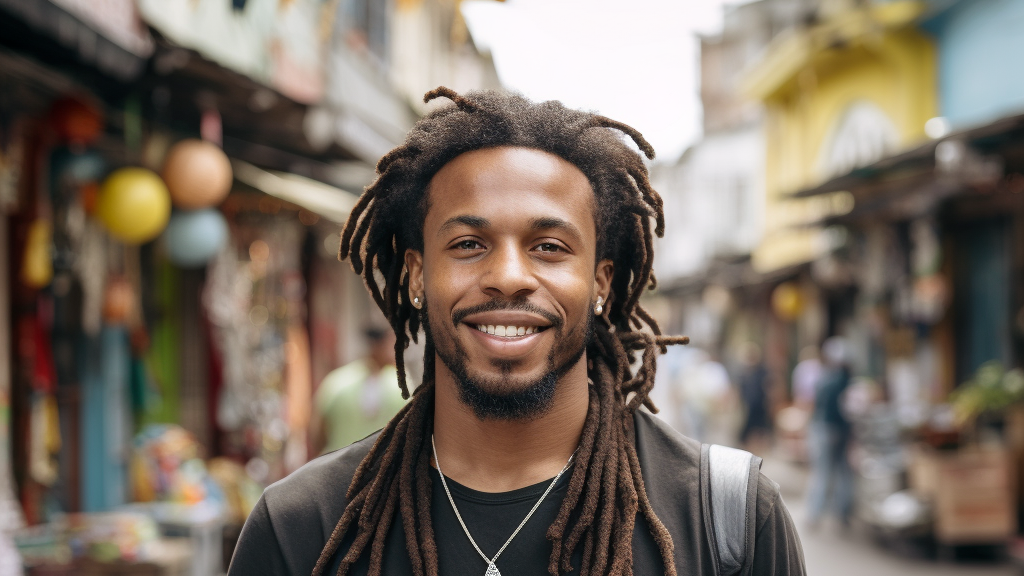
Rasta Connection
"At 21, working in corporate, I was spellbound by a Rastafarian named Rohan in a vibrant dashiki. It wasn't just his outfit but his unique hairstyle that captivated me. Dreadlocks, reminiscent of the reggae culture I recalled. Curious? Read more."
For more than thirty years, I have maintained my natural dreadlocks without any intention or consideration of cutting them. "Dreads for life" is my motto. One reason I've persevered when many people I knew cut them is my determination to shape my life based on my beliefs and preferences rather than conforming to others' ideas or concepts.
First Encounter
When I was twenty-one and working for a corporation, I first encountered dreadlocks. It happened during my lunch break at a cafe, where I met a local Rastafarian named Rohan. I was instantly captivated by his presence as he stood in line. He wore an African dashiki outfit with vibrant red, gold, black, and green colors. What fascinated me even more, was his long hair, which resembled braids, but I realized it was something different upon closer inspection. I was truly mesmerized by his unique hairstyle. Then I remembered I had seen this hairstyle before. Reggae!
Until then, my love for Reggae music and its positive messages led me to believe that dreadlocks were mainly associated with iconic Reggae musicians like Bob Marley, Steel Pulse, and Burning Spear, among my favorite bands at the time. Interestingly, most boys in my community and I wore braids as our preferred hairstyle during my teenage years, but our neighborhood never embraced or introduced dreadlocks. It makes me wonder how we transitioned from braids to Afros without considering dreadlocks as an option.
Dreadlocks and Rastafarism
Rohan and I quickly became close friends, and I eagerly sought every chance to meet with him. I was fascinated by how he thrived and succeeded in America while proudly wearing African garments every day and embracing his natural "nappy" hair, which went against mainstream beauty standards in the country.
Rohan taught me that dreadlocks hold profound symbolism and importance for Rastafarians. They represent strength, purity, and spirituality and are lovingly cared for and adorned with beads or other natural decorations. Rastafarians believe that dreadlocks channel positive energy and wisdom. The locks serve as a visible expression of identity, faith, and freedom from societal norms, embodying African heritage's roots, history, and principles.
My Life, Rohan's Life
While Rohan dressed in stunning African dashikis, my job required expensive dark business suits, white shirts, and neckties. Despite working extra hours, my salary remained fixed, unlike Rohan, who earned good money through his side businesses. Additionally, he followed a vegan diet and consumed natural, mostly raw foods, leading to better health than mine.
Rohan was living a life that resonated deeply with my aspirations. Interestingly, the path I was already carving for myself aligned with the principles of Rastafarianism. Before meeting Rohan, I had adopted a vegan lifestyle, read books about black culture, reduced my drinking and partying on weekends, set health goals, and started saving money to pay off my school loans while striving for financial independence. Like Rastafarianism, I began rejecting Eurocentric beauty standards and wholeheartedly embraced my natural hair.
The Transformation
My friendship with Rohan sparked a transformation within me, accompanied by numerous questions. Could I maintain my corporate job in America while proudly growing dreadlocks as a tribute to Black culture? What would my colleagues think? Was conversion to Rastafari necessary to embrace dreadlocks? How does one start growing dreadlocks? Would my family be proud or embarrassed of my dreadlocks? Despite the uncertainties, one thing remained clear: I desired the freedom to dress according to my style, grow my hair as long as I wanted, and still achieve the material possessions I desired.
Learning about Rastafari and its principles helped me understand my cultural heritage and genuinely express myself. I continued to ask myself if I had what it took to go against cultural and social norms. Could I design the life of my dreams as described above? The final choice to grow dreadlocks came to me after a thought-provoking trip to New York City.
(Author's note: I am not an expert on Rastafarianism and will not attempt to give a full interpretation of the sacred religion. Further your studies through other resources in libraries and the Internet.)
Boost your impact! Share this post with family, friends, and co-workers using the social media icon below. They'll value your recommendation!


